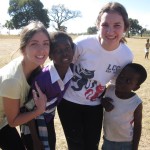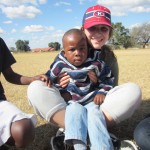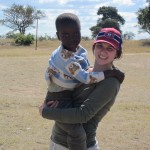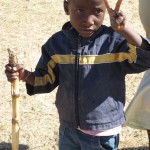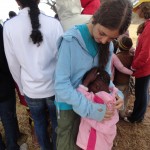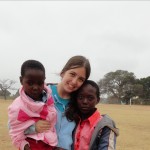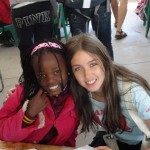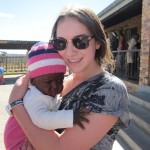This past summer, Melissa and I embarked on the trip of a lifetime. Not knowing anyone, we signed up to go on a community service trip to South Africa, Botswana and Zambia. All we knew was that the food may or may not be good, the people we’d meet may or may not speak English and the bugs may or may not give us malaria. What we didn’t know was that HIV/Aids would be the topic of conversation for 12 days out of our 25-day trip. We had known that Sub-Saharan Africa was more infected with Aids than the rest of the world. Out of all 35 million people infected with HIV/Aids, 25 million of them live in this region. But we didn’t understand that the majority of the people infected had little to no understanding of how to save their own lives.
To our knowledge, the first community we visited was where HIV/Aids had the most impact out of the rest of the towns we went to. This township was called Acornhoek, located just west of the famous Kruger National Park in South Africa. Acornhoek has a population of 150,000 people. 50% of this community is infected with HIV/Aids, which means 75,000 people are infected. The average income in this region is 300 to 1000 rand a month, which translates to a maximum of 120 dollars per month, which only covers 14% of the monthly cost of ARV’s, the aids treatment medication that lessens the symptoms. The cost of ARV’s is from $10,000 to $15,000 a person PER YEAR or $833 PER MONTH. This fact is not only extremely sad, but it is also very scary.
We worked five days in a smaller village within Acornhoek, at the Sihlekisi Primary School. This school was government funded, however, the caliber of the teachers and the curriculum was questionable. In the schools, they learn very basic things about HIV/Aids prevention, but it is often times countered by the stigmas in their culture. Another problem is that the things they learn about HIV/Aids are in English, and the children understand very little English. The children were on their break when we were there, so they came to schoolyard everyday to play, and everyday they returned wearing the same dusty clothes, the same bare feet and the same smile running from ear to ear. Despite the 50% chance that these kids were fatally ill, and that they were extremely poor, they always had a smile on their faces and were ready for any game of soccer or any hand game we had prepared. The hardest part was that we couldn’t believe that our new little friends might be sick. It didn’t make sense to us that a child so happy and so pure could have HIV/Aids. The realization when we were given the 50% statistic hit us like a brick. It just made no sense.
One of the nights we spoke with an older Afrikaans man named Pieter; he owned the lodge that we stayed at near Acornhoek. He was the man who told us of the fate of 50% of the children, and he explained the stigmas of the native African people in Acornhoek. The first stigma he explained was the city theory. This theory is that women believe HIV/Aids come from the city, mainly Johannesburg. They believed this because the men often go away to work in Johannesburg for six months at time. When they are there, the women believe that they get lonely and hire prostitutes. When they come back home to their isolated villages, they force their wives to have unprotected sex because they view condoms as a symbol of betrayal and distrust. More often than not the women, the men and their children wind up getting infected, which only validates the assumption women make that their husbands are cheating on them.
Once contracting HIV/Aids, the people view it as a consequence to sinning and are completely shunned. Women will hide when they bottle-feed their children, as using bottles is a sign of sickness. Another reason to be shunned in these types of villages is to want a better life. The people who leave to get higher education in Johannesburg or Cape Town often times cannot return home, because they are seen as traitors who leave their families behind. This causes a lot of trouble because we all know that with education comes knowledge on prevention and, obviously, success. A successful person within these communities is exactly what they need for motivation, and that very rarely happens because people do not want to be excommunicated.
Another one the major problems is the government’s release of false prevention tactics. In 2005, a 31-year-old woman who was known to have HIV accused Jacob Zuma, who is now president of South Africa, of rape. Jacob Zuma insisted that it was consensual, however the girl still kept pressing charges. The problem in all this was that it came up that he did not use a condom, even though he knew she had HIV. In response to that, Zuma stated that he took a shower to, quote on quote, “cut the risk of contracting HIV.” HIV/Aids specialists and health educators tried desperately to clear this mess, however, in a country where HIV/Aids is so widespread, it is RIDICULOUS that a political leader would say something so untrue and detrimental to the health of his own country.
Many of the children in these towns have been orphaned by the HIV/Aids epidemic. Since many of middle-aged parents are dying due to the sickness, the grandparents of the children end up being their caretakers. The elderly have no source of income because they are too old to work. Essentially, this also makes them too old to care for children, and the government has no pensions or funding for guardians. Currently, there are very few organizations that care for the elderly. Since the grandparents and parents of children have such a high mortality rate, children very often become orphaned, which has grave consequences. When children, mainly young girls, cannot support their families, they resort to prostitution. This leads us back to the spreading of HIV/Aids mentioned before. The entire process seems to go around in circles.
After our trip, we came home with so much more insight on what our role was in the future pertaining to HIV/Aids prevention. This trip has forever made us activists on what Africa really needs in order to stop this epidemic. They don’t need shoes, because they won’t wear them. They don’t need toys, because that causes dependence. They need money for ARV medication, they need care for the elderly, and they need knowledge and a change of view on condoms. What they really need is access to education – not the tangible things we can give them. They need to learn how to take care of themselves, because if we do it for them, they will never learn. The money you all have donated to the Stephen Lewis Foundation will give them treatment, care for the elderly and education. When it comes to Africa, give back in ways that will improve health and education, because with health and education comes a better life.
Help prevent HIV/Aids, help save Africa, help save the world. Thank you.—Melissa Cape ’12, Alexandra Storozum ’12
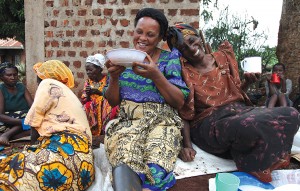 Grandmothers are very special. Whether it’s their capacity to laugh, support grandchildren, or see them a little more objectively than their parents, grandmas are essentially our students’ very own personal fan clubs. I have seen that special look of joy and pride in grandma’s eyes, at school science fairs, plays, the athletic sidelines and closing ceremonies. Grandma’s presence and her smile can make all the difference for a student.
Grandmothers are very special. Whether it’s their capacity to laugh, support grandchildren, or see them a little more objectively than their parents, grandmas are essentially our students’ very own personal fan clubs. I have seen that special look of joy and pride in grandma’s eyes, at school science fairs, plays, the athletic sidelines and closing ceremonies. Grandma’s presence and her smile can make all the difference for a student.
